- Home
- Linda Byler
The More the Merrier Page 2
The More the Merrier Read online
Page 2
Some days she had gathered dandelions and boiled the succulent new leaves in salted water. She put a bit of lard in the hot cast iron frying pan, stirred a cup of flour into it, watched it thicken, then added milk and the greens with a few hardboiled eggs stirred into the thick creaminess. Without bacon, it was bland, but the children said nothing, bending their heads and shoveling the life-giving food into their mouths with appreciation. Empty stomachs that have been in that state for too long can be easily filled, Annie reasoned. Soon there would be new onions and radishes, tender green lettuce to make creamed lettuce with onion and hardboiled egg. Meat was so low she could hardly remember cooking a large piece of beef or pork. To butcher a chicken meant the waning of her egg supply, and she needed the eggs to sell at the local grocery.
She’d have to send the boys to the creek soon. The trout would be hungry and she could make a fish stew. There were still dried navy beans in the cloth bag on the pantry floor, and flour. Salt, coffee, molasses, and cornmeal. Milk and eggs. The lard can had been emptied a few months ago, so she’d resorted to buying it, something she had never done while Eli was alive. There had always been the butchering of hogs, in the fall when the frost tinted the grass and days were filled with the winds of oncoming winter.
The weight of her responsibilities was crushing. She could have told the deacon in the church and received help, but it was not Annie’s way. Stoic, longsuffering, and proud, she lay awake at night without the comfort others would readily have provided. She would keep the farm somehow, even if it meant sacrificing food and any earthly pleasures. Headed to the stairs, she caught sight of Emma’s and Lydia’s shoes, which seemed to mock her determination. They were much too small, and the soles were already separated from the shoe. Well, at least it was warm enough to go barefoot most days now.
Chapter Two
IN THE MORNING, AFTER A DEEP SLEEP CUT short by the harsh jangling of the windup alarm clock, things took on a new perspective as she made her way to the barn to milk, the translucent glow of the waning moon lighting her way. She got down the oil lantern from its wooden peg, set it on the board provided for this purpose, struck a match, tilted the glass chimney, turned the wick, and proceeded to light it. The small orange glow emitted enough light to see the seven cows in a neat row, tied to their stanchions, their tails swinging idly as they turned their heads to look at her with soft, liquid eyes.
She hung the lantern from a hook that swung from a heavy beam, grabbed the three-legged wooden milking stool and the heavy steel bucket, pushed on Marigold’s hipbone, and sat down to milk. She tugged on the swollen teats after wiping them clean, then began the steady rhythmic squeezing of the front quarters, her hands clenching and unclenching as the milk flowed in thick streams, hitting the bottom of the bucket noisily.
Now where was that Enos? He knew the cows should be given their feed while she milked. It always kept them content. When Suvilla opened the cow stable door and let herself in, shivering, Annie asked where Enos was.
“He’s not my responsibility,” she answered sharply.
“Suvilla, I’m in the middle of milking. Go to the house to see where he is.”
Without bothering to reply, she went, obeying her mother in spite of her reluctance.
Annie continued milking, working through the normal tiredness of her fingers till she had the first cow stripped clean of her milk. A blush of color appeared on her cheeks. She felt invigorated, ready to tackle any job, no matter how strenuous.
“Good morning, Enos, sleepyhead,” she called out when he stumbled into the warmth of the cow stable.
He grinned sheepishly, stretched and yawned, then propped the palm of his hand on the rough wooden post that supported the heavy beams above them.
“I was tired.”
“Well, you need to feed the cows, quickly. Bessie needs an extra half scoop, she’s milking heavily since she calved, alright?”
He nodded and ambled off, his lanky frame already showing promise of being tall and strong.
The tinkling of streams of milk hitting the bottom of Suvilla’s milk pail, accompanied by the rasping of the feed leaving the metal scoop, the pungent scent of cow manure, ground corn, and loose hay, the grinding of the cows’ teeth, were all familiar sounds that held the promise of her world righting itself and settling comfortably on strongholds of hope. The long night with its talons of fear was a thing of the past.
Pleased to see the second galvanized steel milk can fill to the brim, she set the strainer aside, set the lid on top, and tapped it firmly in place with the rubber mallet. Then she helped Suvilla lift it into the cold water of the cement cooler. There would be five full cans to be rolled on the back of the wagon and taken to the end of the farm’s drive for the milkman to pick up.
She cooked breakfast that morning with a song on her lips, whistling low under her breath as she boiled the strong coffee, sliced the congealed cooked corn mush into neat rectangles, and fried them in shimmering hot lard. Suvilla sliced bread from the high loaves and placed a slice in each soup bowl, only half a slice in the smaller children’s bowls. Annie added milk and a bit of maple syrup to the coffee, then called the children to breakfast before flipping the slices of mush, standing back to avoid the needles of spraying lard.
Her mouth watered as she slid the pans to the middle of the stove, using her apron as a hot pad. She got down the hook to lift the round stovetop lid and reached for a few sticks of wood. The fire was dying down, and to fry mush properly you needed plenty of heat.
Rebecca was crying as she made her way down the stairs, her bare feet creating the uneven rhythm of a small child’s descent. Annie had no time to comfort her, so she told Emma to go see what was wrong, then got down two plates to hold the golden rectangles of fried mush. She ladled the milky, sweet coffee grounds that had settled on the bottom of the kettle, then slid into her chair and bowed her head with her hands folded in her lap. The children followed suit without being told, lifting their heads after Annie lifted hers. The silent prayer was always a time of gratitude for what was placed before her, but it was also a time of discreet observation of each of her children’s obedience or lack of it.
Suvilla used to be extremely devout, her head bent so far down that her chin grazed her thin chest, her eyes closed in concentration as her lips moved in prayer. Lately there were times when she seemed to not be praying at all, her head barely bowed. Beside her, Enos’s eyes roved across the table, turning slightly to check the amount of wood in the wood box behind the stove, his thoughts very obviously not related to food in any way, while Ephraim was praying quite piously. The smaller children all bowed their heads, some more than others, but all were obedient to the unspoken rule of “patties down.”
When Annie lifted her head, she had a clear view of the white barn. She blinked, then took the back of her hand to wipe her eyes, thinking the mist by the cow stable window was a blurry vision. A wisp of fog? But the morning was so clear, so painfully bright and lovely and windy.
There it was, though.
She half rose from her chair, her eyes wide.
“What is it, Mam?” Suvilla sked, her spoon halfway to her coffee soup.
“I’m not sure. Enos, look. Does it look like something is in front of the cow stable window?”
He turned halfway from his seat on the bench, then swung his legs over before getting to his feet, then hurried to the window.
“It . . . it looks like smoke?”
It was a question he already knew the answer to.
He was out the door without further words, Suvilla and Ephraim on his heels, followed by a white-faced Annie, running as best she could with the loose sole of her shoe flapping.
When Enos yanked the barn door open, it was the draft of air that gave vivid life to the smoldering flames that licked along the wick of the kerosene lantern they’d thought to be extinguished. The flame had crept along the glass after it had fallen from its precarious perch on the board along the wall, finally reaching the small
tank and erupting into flame, flames that licked greedily at loose hay and dry boards, bits of sawdust and dried fabric feedbags. With no breeze, it burned lazily, cleanly, a line of low flames snaking out from the contained kerosene fire on the cemented walkway where the lantern had fallen.
The cows mooed now, tugged at the restraints, danced from foot to foot. Their eyes rolled in terror as the heavy smoke increased to a dense black cloud.
“Let the cows lose!” Annie screeched, her voice a roar above the crackling flames. She plunged directly into the stinking black smoke from the kerosene lamp, now fanned by the rush of cold wind that blew through the opened door.
The cows were panicked now, bawling and jerking back on the leather collars around their necks, their hips and legs swaying first to one side of their stalls, then another, trying in their own clumsy way to free themselves from the oncoming flames, which made it extremely difficult to loosen them.
Her eyes watering, coughing and gagging, Annie tried desperately to find an opening between the first two cows, but their agitation made it impossible. The moment a panicked cow felt a hand on her hip, she leaned into it, squeezing the limited amount of air from her already tortured lungs. She heard coughing, tried to cry out to Enos and Ephraim.
“Get out! Go back!” she screamed, now that she felt the immensity of the smoke’s evil power.
She was awakened by a distant noise, someone calling her name. Immediately she found herself retching and heaving, giving in to the thick slime in her throat. Unable to open her eyes, the burning like a living worm encrusted with pinpoints, she lay on her back with tears from her squeezed eyelids creating tracks through her smoke-blackened face, gasping for breath, before turning to retch again.
“Mam, Mam!”
She heard the agonized cries from Suvilla and wanted to answer, but was overcome by wave after wave of crushing nausea. She was aware of Enos and Ephraim, wanted to raise a hand in protest, but could do nothing but turn her head and heave weakly into the cold, windblown grass.
Dan Beiler had gone to the small town of Intercourse to the hardware store known as Zimmerman’s, having run out of two-penny nails when he was in the middle of remodeling his kettle house. His horse was feeling his oats, which was a nice way of putting it, he thought grimly, as he hung on to the reins and hauled back with all of his strength. He didn’t know where the line between running away and merely running was drawn, but he knew this old hack he was driving didn’t feel as if it would hold together too much longer, at this alarming rate of speed. After he had the creature under control, he decided the horse needed a longer run to rid him of all this excess energy, so took the long route between New Holland and Intercourse by way of Smoketown along the Old Philadelphia Pike, and allowed the crazy horse to stretch out and run until he played himself out.
He could see the billows of smoke even before he heard the fire alarms, tugged on the right rein, and turned onto the next road he figured would take him to the fire. Someone might need his help.
The farm was set back from the road, a clump of maple trees surrounding the two-story white farmhouse, a white barn that was in the throes of an evil fire licking at it from within, by all appearances. He had no idea whose residence it was, but he passed men on foot, drove into a field as fire engines screamed behind him, then hurriedly tied his lathered horse to a fence post and ran all the way to the fire.
On approaching the burning barn, hearing the agonized bawling of tethered animals, he remained reasonable, and stayed away. He was on his way to offer his services to the firemen instead when he found the small group on the grass behind the smokehouse, the terrified children grouped around a blackened person half sitting, half laying against the side. He could see she had been inside the burning building, as had the oldest children.
“Is she alright?” he asked, squatting beside her to look into her face.
Suvilla replied, coughing between words. Her hair was singed and her face streaked with black. “I think she got kicked, but we dragged her out. Somehow . . .”
She looked a little dazed. “Wow,” Dan answered solemnly. “You saved your mother’s life. Has a doctor been called?” He looked around, wondering why none of the firemen had come to help this woman.
Suvilla nodded, said someone was coming.
He looked at the woman’s face, reached out to touch her shoulder as she opened her eyes. He was met with a depth of sorrow and suffering that spread through his soul.
“I’m alright, I think,” she whispered.
And still she held the light in his eyes.
“Where is your husband?”
The three little girls were huddled on the ground with their mother, and spoke as one.
“He’s in Heaven.”
Dan nodded. Small, blackened, defeated, she was like a flower beaten by storms, stomped on and mangled. A great pity welled in him, an empathy that filled his chest until he couldn’t speak. He merely bowed his head and allowed her pain to be his own. He knew exactly what she had gone through, was going through. He’d been down that road himself, only three years ago.
He steadied himself with a deep breath.
“Let’s get you into the house.”
She shook her head. “I can’t walk.”
He looked around, saw the flames, the exposed beams, the fire trucks, the crowd, heard the crackling and hissing. He asked the children to step aside, then slid one arm beneath her shoulders and another one beneath her knees and easily picked her up off the ground and carried her into the house, one arm dangling.
She protested quietly, but she was weeping, so words were difficult. He put her on the old davenport, pulled the green blinds, and told her to stay inside with the children. He instructed Suvilla in getting a hot bath for her mother, and how to fix a bracing cup of mint tea with milk and honey. When the doctor arrived, he left quietly, suddenly feeling out of place and useless.
The barn and all its contents were completely destroyed. The pigs in their pigsty and the twenty chickens in the henhouse survived. The horses were out to pasture and stayed there, but one of the wooden wagons parked in the haymow burned to the ground with the rest of the barn.
Dan Beiler went home to his children and told them the story of his almost runaway horse and the subsequent fire, the widow and her eight children. He could not get her image out of his mind—those sorrowful eyes that were the color of oak leaves beginning to turn.
He went to the barn raising when the whole place was swarming with women bringing copious amounts of simple food, burly men and skinny teenagers working side by side to erect a new barn for the widow and her eight children. When he was on the highest rafters he found himself trying to get a glimpse of her, but he saw only her children. Where was she? Was she still recovering from the smoke inhalation? Perhaps she was more seriously injured than he had thought. But surely the men would be speaking of it if that were the case. He wanted to ask, but he knew if he did, eyebrows would be raised immediately, and that was the last thing he wanted. A widow and a widower. Aha.
Dan thought back over his last three years of emptiness and grief. The first year had been like living in a dense black cloud. His world had become a gray landscape that contained only enough oxygen in the atmosphere to keep him alive. His only reason for living was his six children: Amos, Lavinia, Hannah, Emma, Joel, and John, starting at age twelve and continuing every other year except for Hannah and Emma, born only a year apart.
He’d carried the vulnerability of self-blame for his wife’s death for too long. Pneumonia was common, but some recovered. She had not. A long winter of arnica, onion plasters, mustard plasters, comfrey tea, kerosene and brown sugar, turpentine, pills from the doctor that had given her relief for a few days, before she fell victim to her agonized coughing, her lungs full of infection and bacteria.
He had loved her with a quiet, gentle, undemanding kind of love, a husband who made life a bit cozier in hard times. The children knew nothing but a home that was a safe haven wit
h an atmosphere of harmony and understanding, so when they were plunged into a sea of grief and dreadful emptiness, Dan had his work cut out for him, balancing the farm and his bewildered children adrift in a new world.
Almost, he’d married Bertha Zook, a sweet woman who had been too busy caring for her ill parents to ever date or marry. Urged on by his family, stating the need to acquire a mother for his children, he tried to love her the way everyone was sure he would. They had sat together in her parents’ kitchen, and he found her intelligent, well spoken, certainly with a loving heart. But something was missing, and after several months he decided it was wrong to drag the relationship on any longer. He knew for certain he was never going to ask for her hand in marriage, and so he told her that any man would be blessed to have a wife such as she, but that he was not ready to remarry, and that she should not wait for him.
Nothing stirred him emotionally as far as friendship with a woman went, so he was shocked to find himself thinking so much about the widow Annie.
Annie had, in fact, spent a few days in the hospital in Lancaster until her lungs cleared up. Her mother and sisters stayed with the children until she was well, and later cooked food for the barn raising. They had no doubt she’d be all right. The Amish community would band together to help her; a poor widow touched the hearts of everyone around her.
The church paid for the barn, her father provided cows, the sun warmed the earth and the rain replenished it. Potatoes and peas went into the soil, and sprouted in long green rows like small soldiers lined to attention. Annie could hardly grasp what the folks around her had done to help. It was almost too much. She had no choice but to let go of her pride and simply let the gratitude-filled tears flow. The morning of the fire became a painful blur in her memory. She pushed it aside, knowing if she dwelled on the horror of that day she’d never accomplish all the tasks at hand. Though she did sometimes wonder about the man who had carried her to the house. Or had she just imagined that? She had been in something of a delirium for those first twenty-four hours. But the voice . . . she remembered his calm, soothing voice so clearly. She could ask her children, who had miraculously been unscathed, but no, that would not be proper.

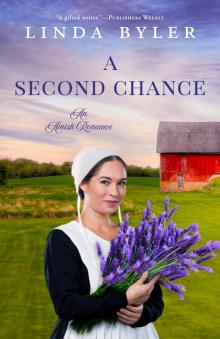 A Second Chance
A Second Chance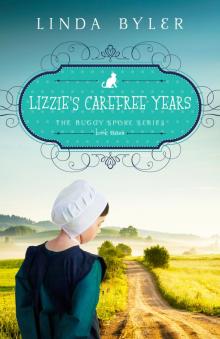 Lizzie's Carefree Years
Lizzie's Carefree Years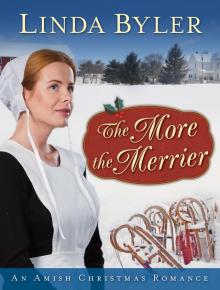 The More the Merrier
The More the Merrier Love in Unlikely Places
Love in Unlikely Places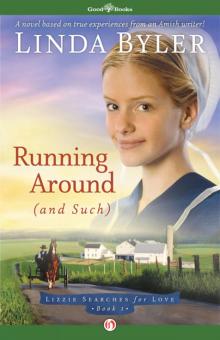 Running Around (and Such)
Running Around (and Such) Wild Horses
Wild Horses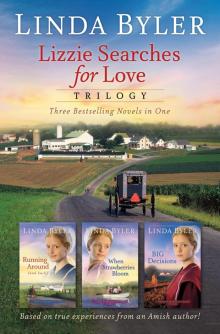 Lizzie Searches for Love Trilogy
Lizzie Searches for Love Trilogy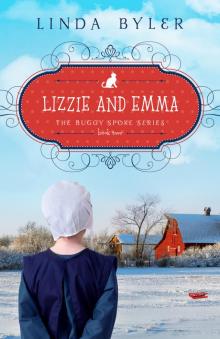 Lizzie and Emma
Lizzie and Emma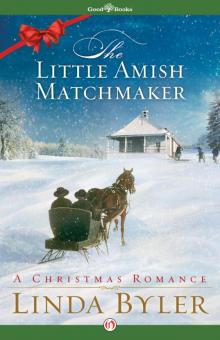 Little Amish Matchmaker
Little Amish Matchmaker The Witnesses
The Witnesses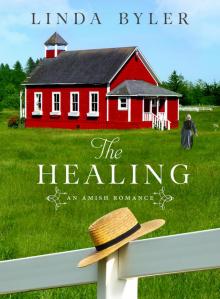 The Healing
The Healing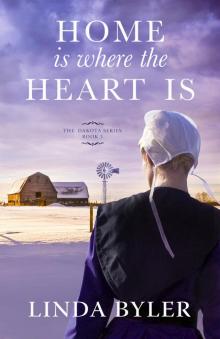 Home Is Where the Heart Is
Home Is Where the Heart Is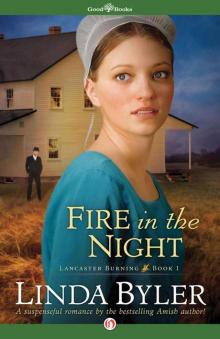 Fire in the Night
Fire in the Night When Strawberries Bloom
When Strawberries Bloom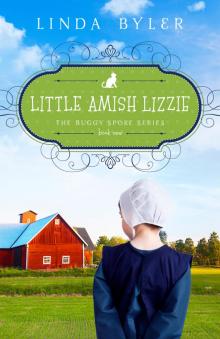 Little Amish Lizzie
Little Amish Lizzie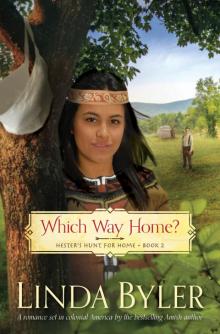 Which Way Home?
Which Way Home?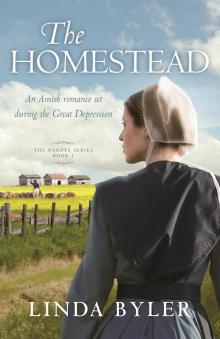 The Homestead
The Homestead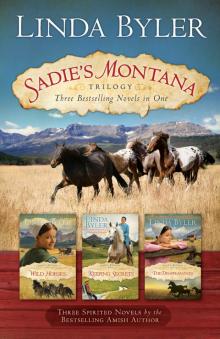 Sadie’s Montana Trilogy
Sadie’s Montana Trilogy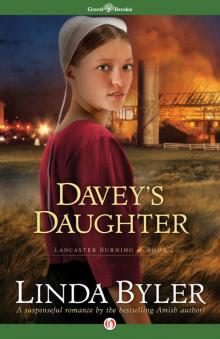 Davey's Daughter
Davey's Daughter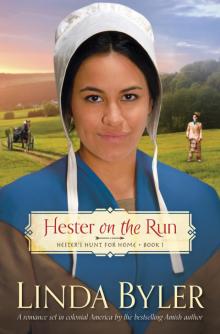 Hester on the Run
Hester on the Run Disappearances
Disappearances Big Decisions
Big Decisions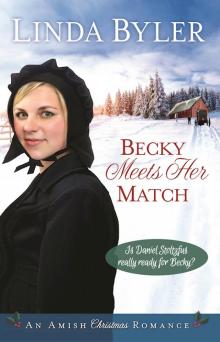 Becky Meets Her Match
Becky Meets Her Match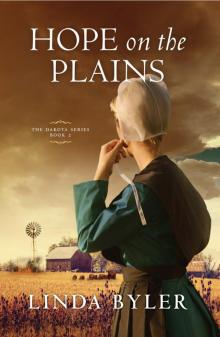 Hope on the Plains
Hope on the Plains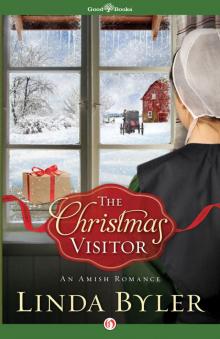 Christmas Visitor
Christmas Visitor